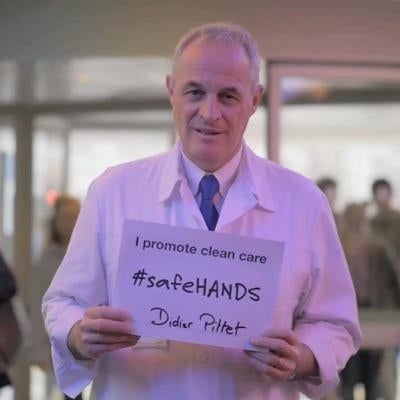Congratulations WHO!
B. Braun celebrates the 10th anniversary of the WHO program, which has achieved major improvements in hand hygiene to help reduce HAI.
According to WHO, health care-associated infections (HAI) affect hundreds of millions of patients around the globe. “People die or are considerably affected by diseases such as methicillin-resistant Staphylococcus aureus (MRSA) and other severe infections acquired during patient care”, says Professor Didier Pittet, Director, Infection Control Program, University of Geneva Hospitals and Faculty of Medicine and External Program Lead for the WHO’s First Global Patient Safety Challenge: Clean Care is Safer Care. “By cleaning their hands, health care workers can help prevent such diseases and contribute to reducing the global burden.”
Prof. Pittet comments on the WHO campaign
Clean Care is Safer Care was introduced in October 2005 and has operated for 10 years. It focuses on healthcare worker hand hygiene to support the reduction of healthcare-associated infections and their consequences. Many positive steps have been realized. In an interview Prof. Pittet comments on the achievements of the campaign.

Why is hand hygiene the right topic to focus on with regard to HAI?
Prof. Pittet: Hand hygiene is the first step to prevent healthcare-associated infection and the spread of antimicrobial resistance. Staff compliance with this practice is still low in many hospitals and healthcare settings around the world. Compliance with hand hygiene has proven to significantly improve if practitioners apply the World Health Organization (WHO) multimodal promotion strategy. The strategy is made of 5 critical components: staff education, monitoring and performance feedback, workplace reminders, institutional safety culture and system change. System change refers to the systematic use of alcohol-based hand rub according to precise indications illustrated by the WHO model: "My Five Moments for Hand Hygiene". The 5 components of the WHO promotion strategy can be monitored regularly at the institutional level through the use of the scoring system of the WHO Hand Hygiene Self Assessment Framework. The best hospitals around the world are recognized and given the Hand Hygiene Excellence Award.
Imagine the campaign would have been stopped after some years or didn’t start in the first place. Which achievements would we miss today?
Prof. Pittet: Successful hand hygiene promotion has been associated with a very significant decrease in healthcare-associated infection rates all around the world, leading to reduced morbidity, mortality and extra use of resources in the healthcare system. Estimates indicate that the WHO campaign 'Clean Care is Safer Care' saves between 5 and 8 million lives through better hand hygiene in healthcare each year. We will simply miss the opportunity to save millions of lives every year!
The campaign raises awareness for the effectiveness of hand hygiene in the matter of patient safety, among other goals. After 10 years, what still needs to be done? What do we need to focus on in the next 10 years?
Prof. Pittet: Success is a reality in a very large number of hospitals and healthcare settings around the world, but not all. The ambition is to reach every point of patient care, anywhere where care is provided. So there is still a long way to go. More than 20,000 hospitals in 179 countries are registered with the Save Lives: Clean Your Hands campaign. If every hospital in the campaign could mobilize 3 others to join, we would scale up more rapidly and improve patient safety and save lives even more efficiently. There is a video which summarizes some of the accomplishments of the first 10 years of Clean Care is Safer Care, the doorway to infection control and patient safety. A new unit for infection prevention and control will be created at WHO in 2016, and many more challenges to come will be addressed. Among those, parameters associated with success, scaling up, and sustainability of interventions will have to be understood and tools to maintain the system and behavioral change need to be introduced.
Hand hygiene
WHO and B. Braun
B. Braun is part of the Private Organization for Patient Safety (POPS) of the World Health Organization (WHO). Their goal is to reduce healthcare associated infections by improving hand hygiene, based on the overall aim of the WHO Clean Care is Safer Care Program. B. Braun is commited to raise the awareness worldwide about the importance of hand hygiene.





